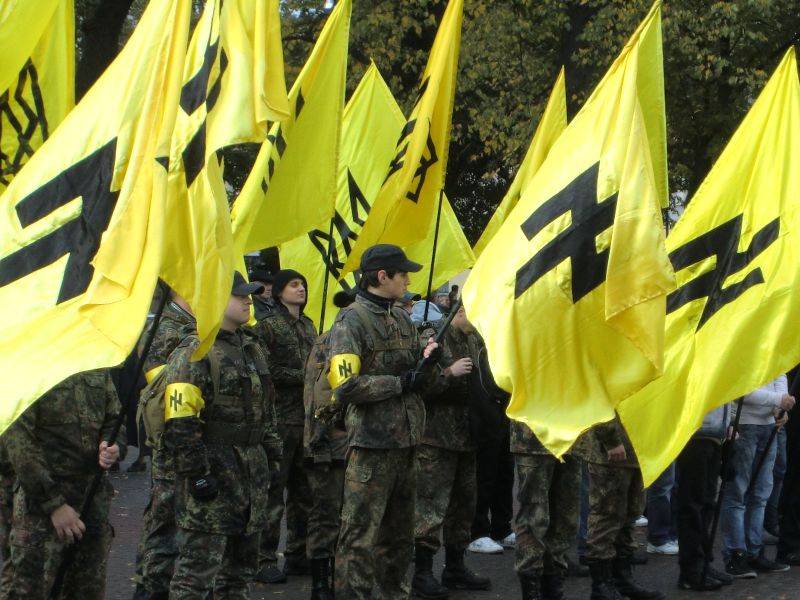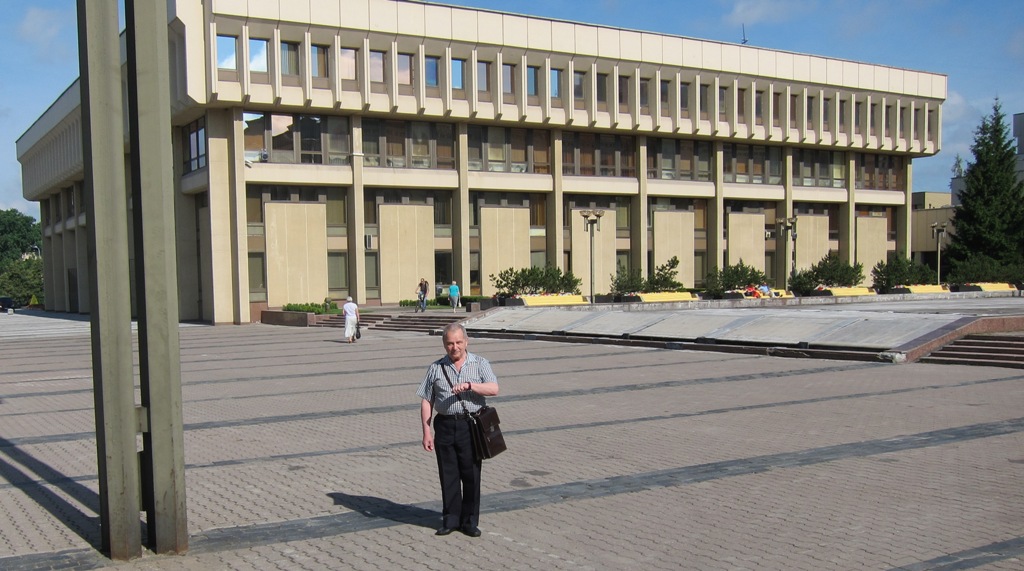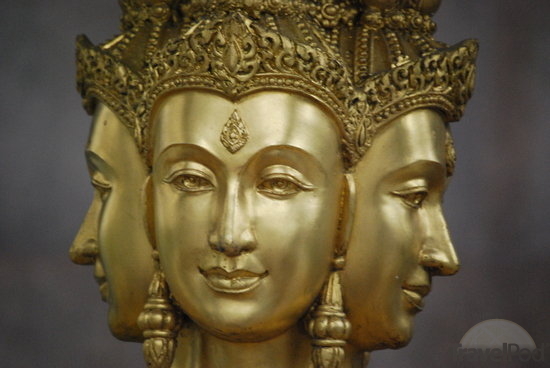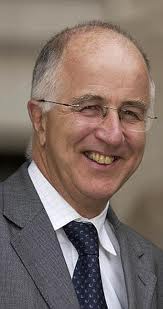VILNIUS. One of the staples of diplomatic life here is the annual Hungarian National Day reception hosted by the Hungarian Embassy in Vilnius. Under the leadership of the previous ambassador to Lithuania, HE Péter Horváth Noszkó, his nation’s embassy became a locus of inter-community and inter-cultural dialogue that helped further civil society in the Lithuanian capital. He thereby raised his country’s profile to that of an open forum par excellence, where all — not least minority groups — could find a place here in this corner of the European Table.
Collaborators Glorified
Hungarian National Day Event in Vilnius Celebrates Lithuanian ‘Forest Brother’; Two Local Fascists Invited
Lithuania Cannot Appease Both World Jewry and Far-Right Extremists
O P I N I O N
by Olga Zabludoff
I commend Didier Bertin’s knowledgeable and sensitive observations in his article “Lithuania and the Memory of the Holocaust.” My comments here are more in the form of a PS to Mr. Bertin’s words. My take-off point is his reference to the term “Double Genocide,” a government-endorsed concept that has been bandied about in Lithuanian political circles in recent times. But more about this later. Mr. Bertin borrows the term for application in a different dual context: the original genocide of the Jewish people and the current movement on the part of the Lithuanian government to neutralize if not to obliterate the remembrance of the Holocaust.
Glorifiers of Pro-Hitler Fascist Groups March in Lviv
by Frank Brendle (Berlin)
Activists in the western Ukrainian city of Lviv wearing uniforms of the former Ukrainian Insurgent Army (known as UPA, from its Ukrainian language initials) marched in a large scale event in the city center today.

Ukrainian Writer Iurii Andrukhovych Asks the EU to Approve Celebration of Local Holocaust Perpetrators and War Criminals as ‘Freedom Fighters’
O P I N I O N
by Grzegorz Rossoliński-Liebe
Iurii Andrukhovych complains in an article published in Gazeta Wyborcza about the sorry state of Polish-Ukrainian relations. He correctly informs readers that in the last ten years Polish-Ukrainian relations, in particular concerning contentious World War II questions, have not improved at all and “if something has changed then perhaps only for the worse”. Yet Andrukhovych’s solution to the problem would be to republish Paweł Smoleński’s collections of essays Pochówek dla rezuna (“Burial of a Butcher”) which, like Andrukhovych in his article, looks for solutions in the revision of stereotypes while ignoring the actual historical causes of current problems.
Mainstream Sajudis Organization Joins Call for Increased Commemoration of Local 1941 Holocaust Perpetrators, with an Ominous Warning to the Jewish Community of Lithuania
In a letter to the editor of today’s edition of the mainstream daily Vakaro žinios (Evening News), three organizations, including the mainstream Sąjūdis, write to complain that the state has not done enough in 2011 to commemorate the 1941 fascist collaborators (including the Lithuanian Activist Front or LAF ‘white-armbanders’), who unleashed the Lithuanian Holocaust, killing Jewish neighbors in dozens of locations before the Germans ever arrived. Many were then recruited for the Germans’ organized killing squads. The organizations signing the letter clearly regard them as national heroes and ‘insurgents’.
The letter to the editor is available online (English translation here).
Lithuanian Government Agencies Provide Financial Support to Fascist Youth Organizations
In an article published today on Delfi.lt, Eglė Samoškaitė investigates state funding for fascist organizations, including those that lead or participate in neo-Nazi marches. A full English translation is here.
A ‘Documentary Film’ Tries to Establish the Legend of the ‘Uprising of the Enslaved’
O P I N I O N
by Milan Chersonski

Milan Chersonski at the Lithuanian Parliament. From 1979 to 1999 Chersonski directed the Yiddish Amateur Theater in Vilnius, Lithuania. He worked in various capacities at the quadrilingual (English-Lithuanian-Russian-Yiddish) newspaper Jerusalem of Lithuania, publication of The Jewish Community of Lithuania, from its founding in 1989 until the paper was closed in 2011. He was its editor-in-chief from 1999 to 2011. He is now a senior analyst at DefendingHistory.com and contributes to various publications.
On September 28th 2010, the Parliament of Lithuania announced that 2011 would be the Year of Commemoration of Battles for Freedom and Great Losses. This mysterious name of some sort of anniversary appeared exactly a week after the same year, 2011, was declared the Year of Commemorating the Genocide of Lithuanian Jews. The Jewish Community of Lithuania reacted without delay to the ‘dual track’, apartheidized commemorations.
Now which “battles for freedom” are they talking about in the resolution? What sort of great losses? The resolution does not say specifically. Yes, Lithuanians valiantly rebelled for freedom in 1794, and in 1831, as well as in 1863, and then there were serious demonstrations on behalf of freedom in 1904-1905, and then there were the battles from 1918 to 1920 for the independence and borders of the newly founded state.
But it is impossible to understand exactly which events and which dates they now had in mind from the text of Lithuanian parliamentary resolution no. XI-1038 of September 28th 2010. And this is probably no accident, as shown by the subsequent actions of the Lithuanian government and leading organizations here.
Račinskas’s Version of ‘Holocaust Education’: Red-Brown Commission Director General Speaks in the Lithuanian Parliament
Updates (newest first):
His views finally came through in English in a German documentary film
Mr. Racinskas calls prominent Holocaust survivor a liar on the commission’s website
He tries to deny LAF murders “on racial basis” before arrival of German forces in 1941
Says European Commission “spits in the face” when it fails to accept a Double Genocide resolution from the Baltics
The following is DefendingHistory.com’s translation (from the tape) of the concluding speech of the 29-30 June 2011 conference (reports here and here), delivered by Ronaldas Račinskas, director general (sometimes listed as executive director) of the government sponsored ‘International Commission for the Evaluation of the Crimes of the Nazi and Soviet Occupation Regimes in Lithuania’ (known for short as the ‘Red-Brown Commission’), which is housed in the Office of the Prime Minister of Lithuania. It can serve as a potent example of the state-sponsored Holocaust Obfuscation movement which presents one face domestically, a second in the European Parliament, and a third to naive Western Holocaust Studies groups.

Simple, really. Tell the locals there was no Holocaust, just a complicated morass of mixed-up perpetrators and victims (and heck, those Jews were mostly communists anyway). Tell the European Parliament there were two equal genocides and they must legislate the equality of totalitarian regimes. And tell the foreign Jews and the West you need money to pursue Holocaust studies and commemoration. They’ll have to believe you. After all, you’re in the prime minister’s office of an EU government. Elementary, really?
A Celebration of the 70th Anniversary of Hitler’s Invasion of Estonia
According to an Lrytas / BNS report (English here), the Jewish Community of Estonia has expressed ‘surprise and displeasure’ over plans to hold an event today to commemorate the seventieth anniversary of the arrival of the Nazis in the city Viljandi.
The Denial that is Part of Holocaust Obfuscation: Second Day of the Lithuanian Parliament’s Conference
by Dovid Katz
The Lithuanian Holocaust broke out in the week of 22 June 1941, when the Nazis attacked the Soviet Union; it is the week when, in many locations, so-called ‘patriots’ and ‘rebels’ in large numbers began to humiliate, plunder, injure and slaughter Jewish neighbors before the first Germans ever arrived. At the conference held yesterday and today in the country’s parliament, this was the Elephant in the Room that reared its head now and again, no matter how hard the political and academic planners worked to ensure that it would disappear in a program dedicated to virtually every other conceivable aspect (translation of original program here; final printed English version of the program here).
SEE ALSO:
The plot thickens. These are the very ‘patriots’ and ‘rebels’ who are being honored this week by major state institutions, and to no small degree, at this very conference. As if their launch of the Holocaust, which went on under German rule, and with their continued massive voluntary participation, is either some kind of uncorroborated slander, or, as if this is some very tiny detail in an otherwise glorious campaign of rebellion against Soviet forces (with no mention that the USSR’s troops were actually fleeing the German invasion, not their ‘rebellion’).
In Delirium of Obfuscation: First Day of the Lithuanian Parliament’s Conference on the 70th Anniversary of Hitler’s Attack on the USSR
by Dovid Katz
Today was Day 1 of the Lithuanian parliament’s two-day ‘International Conference: The Beginning of the Soviet-German War in the Baltic States in 1941 — 29-30 June 2011, Vilnius’. It is being held as part of a series of events to mark the seventieth anniversary of the Nazi War against the Soviet Union, unleashed on 22 June 1941.
Gert Weisskirchen: On Blackwashing History
O P I N I O N
by Gert Weisskirchen
In several places in Europe, particularly in the new-accession states, there are discernible efforts to ‘blackwash’ history.
Far-right forces are hard at work to obfuscate the Holocaust, in part by defaming the victims and in part by glorifying the local perpetrators and collaborators.
Eyewitness Account of the Screening of ‘Uprising of the Enslaved’
by [NAME WITHHELD ON REQUEST]
The premiere of the Lithuanian-language film Pavergtųjų sukilimas, or Uprising of the Enslaved, was held in Vilnius in the early evening of 22 June 2011, timed to coincide with the anniversary of what is commonly called the “June Uprising”.
The Act of 30 June 1941, and its 2011 Commemoration in Ukraine
O P I N I O N
by Grzegorz Rossoliński-Liebe (Berlin)
On 8 June 2011, the internet journal Maidan announced that “on 30 July [2011] at 11 AM exactly a flash mob will read the Act of Renewal of the Ukrainian State simultaneously in seven places in Kiev”. The “flash mob” in Kiev will be commemorating the 70th anniversary of the proclamation of the Ukrainian state by the leading OUN-B politician Iaroslav Stets’ko, who in the evening of 30 June 1941 read out the “Act of Proclamation of a Ukrainian State” during a meeting in the hall of the Prosvita Society in the market place in L’viv, the center of western Ukraine.
Yad Vashem, Causing Pain to Survivors with Participation in Lith. Parliament Conference Lauding Collaborators, Withdraws at Last Moment (after Defending History’s Plea)
UPDATE 1: On 27 June 2011 at 3:31 PM (Vilnius time), the Israeli Embassy in Riga (responsible for Lithuania as well as Latvia) emailed DefendingHistory.com to say that Yad Vashem’s participation in the event has been cancelled. This was confirmed in a further email from Yad Vashem at 3:56 PM. In Vilnius, however, the name of Yad Vashem and its designated representative continue to appear on programs and brochures, giving the impression that the event enjoys the formal participation of Yad Vashem. See our public query to Yad Vashem.
UPDATE 2: See Defending History’s eyewitness reports of Day 1 and Day 2 of the conference.
According to a conference program posted on the website of the Lithuanian Parliament, Yad Vashem is the only Jewish institution sending a representative to the latest conference mounted by the Lithuanian government in its campaign to downgrade the Holocaust and whitewash the Lithuanian Holocaust’s first murderers (the L.A.F. and other fascist groups), often by glorifying them as ‘freedom fighters’. The printed brochure for the conference, to be held on 29 and 30 June 2011, announces the event as a joint project of the Lithuanian Parliament (Seimas) and the deeply antisemitic Genocide Research Center. One of the Center’s top ‘specialists’ participated in the recent neo-Nazi parade and went on to launch a public antisemitic campaign. He was neither removed from his post nor publicly reprimanded, as the season’s conferences plow ahead full steam.
Why Does the State Commemorate Murderers?
Probably every mature person living in Lithuania has heard about the mass murder of people at the beginning of World War II. During the first months of the war ― in a period of less than half a year ― more than 100,000 people were murdered, most of them Jews.
“Evil deeds uncondemned often end up idolized.”
It is sad, but there are more than enough facts corroborating that Lithuanians — regular officers of the Lithuanian military — took part in the mass murders of civilians, women and children.
Education Ministry and Association of Museums Encourage Activities to Commemorate the Activities of ‘Partisans’ including the Murderers who Unleashed the Lithuanian Holocaust; No mention of anti-Nazi partisans…
At the behest of Lithuania’s Education Ministry, the Association of Lithuanian Museums today canvassed museums and other institutions asking for information about what is being done concretely to commemorate the celebration of local fascists who collaborated with Hitler, including the killers who unleashed the Lithuanian Holocaust (Lithuanian Activist Front or LAF), and the collaborationist Provisional Government (PG).
“This Campaign Makes Me Really Angry”
O P I N I O N
by Shimon Alperovich
The following is Rachel Croucher’s authorized translation of the interview with Lithuanian Jewish Community chairperson Dr. Shimon Alperovich published in German by Frank Brendle in Taz.de.
YEAR OF REMEMBRANCE: In the Lithuanian year of remembrance the Holocaust is under threat of being forgotten while surviving Jewish partisans have been the subject of a campaign for some years. Conversation with Simonas Alperavičius, President of the Jewish Community of Lithuania. INTERVIEW BY FRANK BRENDLE, 04.02.2011
Mr Alperavičius, the 70th anniversary of the Nazi occupation of Lithuania falls this year, as well as twenty years of independence from the Soviet Union. What will take priority?
In Major Speech to UK’s Parliament, MP MacShane Confronts Hungarian Injustice, Baltics’ Double Genocide Campaign
Denis MacShane, the veteran Labour Party member of the British Parliament for Rotherham, gave a major speech on antisemitism in the House of Commons yesterday. (Full text of Denis MacShane’s 20 January speech.)
In contrast to politicians across Europe who pay lip service to the battle against antisemitism ‘in general’, Mr MacShane emphasized the actual issues of the day, including two major and ongoing scandals sadly involving member states of the European Union in the new accession eastern area. In both cases, his speech serves to overcome the veil of reticence sometimes encountered when it comes to criticizing Britain’s partners in the EU, NATO, the OSCE and other international organizations.
